Yoon Ha's Story: Part 2 - Life in China
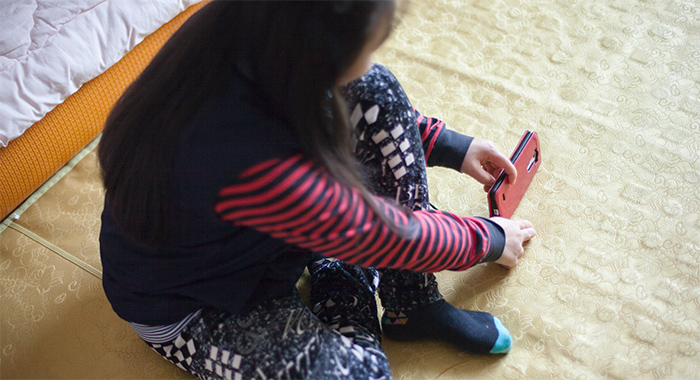
This is the second part of a three-part story. Read part one about the hardships Yoon Ha experienced growing up in North Korea that led her to escape. Part three follows this part with her experience resettling in South Korea.
The couple who helped me escape into China brought me to a house that same night after we crossed the river. There they told me about my options. They said I could work in a restaurant somewhere in China. However, there would be a high risk that I would be caught by the Chinese police and get sent back to North Korea. I already knew that if you get sent back to North Korea from China, you could be severely punished by the North Korean regime.
They said there was another way, which would be safer; I could "marry" a Chinese man. They told me my Chinese husband would protect me from getting caught by the Chinese police. So it seemed that this was the best choice I could make. I had already come to China and I didn’t want to go back to North Korea. I was prepared to do anything to have a better life, so I told the couple that I would live with a Chinese man.
The next morning the couple took me to a car and we started driving.
In the car, I started getting scared. The only thing I knew was that I was going to live with a Chinese man I had never met, and I was just hoping that my life would somehow get better through the marriage. After driving for a while, we arrived in a small city in China. There I met some Chinese people who turned out to be family members of the man I would marry.
I saw one of them give money to the couple who had brought me there. It was then that I realized that I had been sold.
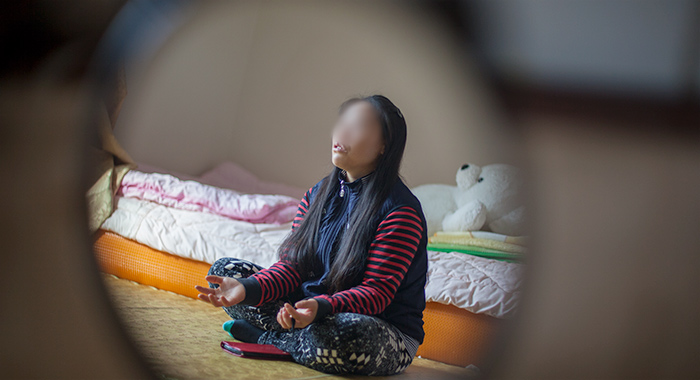
A part of me still felt I could do anything to have a better life. But it didn’t feel good to be sold like an object. Even to this day, there are so many North Korean women being trafficked like I was. This kind of trafficking is now an industry.
I also felt selfish for leaving my mother and sister without letting them know. I came all this way so that I could have a better life, but I missed them a lot. I didn’t know what would happen next or how the Chinese man would treat me. At that point, I wanted to run away, but it was too late and there was nowhere to go. It was a small town in the country and I didn’t know anything, including the Chinese language.
Without having a proper wedding, I started living with the Chinese man - I don’t even want to call him my husband. It was frustrating not knowing any Chinese. And since I was sold into the marriage, I didn’t love the man. So it was really hard for me to live with him.
Despite all of this, I would eventually have my first daughter with him.
He and his family farmed for a living and were very poor. His family didn’t treat me well. They made me do all sorts of hard work on the farm and they would say bad things about me. Sometimes I even got hit. I wasn’t familiar with the area and couldn’t speak the language very well for the first couple of years. And there was always the danger of getting caught by the Chinese police and sent back to North Korea.
I cried a lot whenever I was by myself. I knew I had to keep enduring it for my daughter but it was so tough.
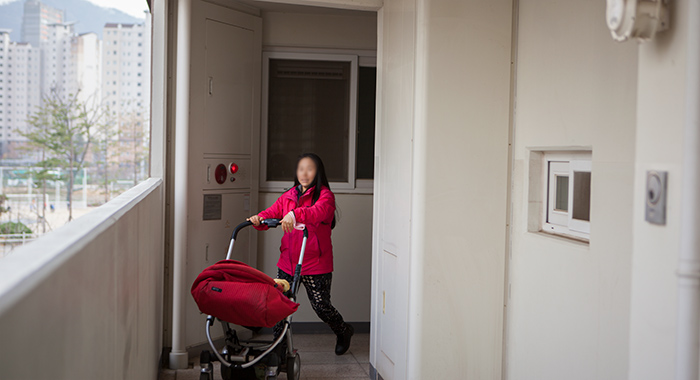
I started hearing from some people around me that I could live safely and freely if I could make it to South Korea. I didn’t want to leave my daughter, but I couldn’t keep living this life without freedom. So I decided to run away, hoping that I could come back for my daughter later.
I soon discovered that it would cost me a lot of money to find people who could take me to South Korea. I had no money, so I ended up getting sold to another Chinese man in order to survive.
Living with the second Chinese man was even worse than with the first one. I still had to do a lot of hard farming work and he was always watching me. He was suspicious that I was going to try to run away. When he went to work he brought me to his workplace so he could still watch me. And he was not kind to me. Whenever I got sick, he didn’t care.
I felt so unloved and suppressed.
Soon, I was pregnant with my second daughter. All the while, my desire to go to South Korea kept growing. I thought about giving up on my unborn daughter, knowing that I couldn’t be a good mother to her while living like this in China. And I knew it would be even harder for me to leave after I gave birth to the baby. But I didn’t want to leave another child of mine for my own freedom.
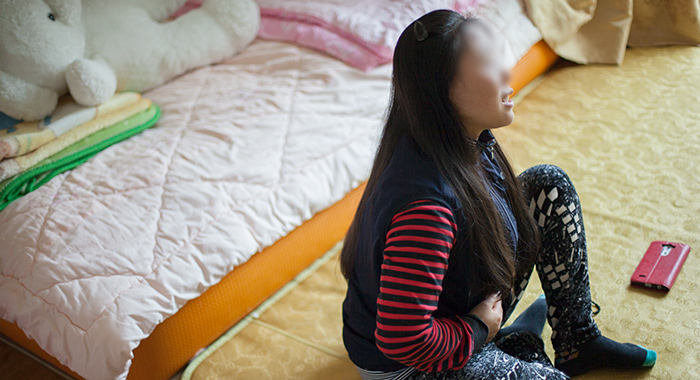
After hearing from some people that I could raise my child with support from the government in South Korea, I started having hope. I dreamt about living there with my baby. So I looked for opportunities to run away from the second Chinese man, even though he was always watching me. At some point, I met another North Korean woman who lived in my town and who had also been sold into a marriage. She said she could connect me to people in a different city who could help me go to South Korea.
When I was eight months pregnant and my stomach was so big, the Chinese man didn’t watch me as much as he had before. Maybe he thought my body was too heavy to run away. So one day I left home, telling him that I was going to my friend’s house. But actually, I was going to another city to meet people who would connect me to LiNK’s network.
When I was about to leave the town, however, I got caught by the Chinese man. He made me sit behind him on his motorcycle and was taking me back to his house. Riding on the back of the motorcycle, my hat got blown off my head by the wind. I asked him to stop so I could pick it up. It was my favorite hat. He said, “No, we aren’t going to stop. Forget about the hat.”
At that moment, my whole heart and body were telling me, “Do not give up on what you deserve. You deserve to have a simple hat and you deserve to live in freedom like a human being.”
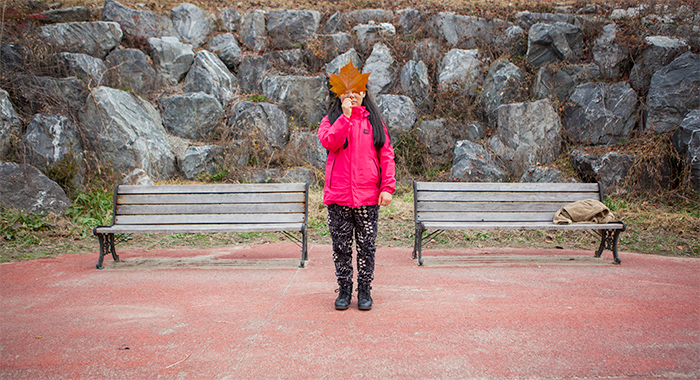
I don’t know how I did it but I jumped off the motorcycle while it was moving. Luckily he wasn’t going too fast and I landed on my back so the baby didn’t get hurt, and I was okay other than scratching my forehead while rolling on the ground.
I got up and started walking toward where the hat fell. The man asked me where I was going and I told him that I was going to get my hat. His motorcycle had lost balance and fallen after I jumped. He didn’t even ask how I was as he started to inspect it for damage. I realized this was my opportunity to run away again. So I grabbed my hat and started running up into the nearby mountains.
I kept going up and up until I was near the top where I could see the road, the man, and his motorcycle. I hid there for a few hours, scared of getting caught by him again. I actually saw him driving around to find me. So I climbed further up and over the other side of the mountain.
Being eight months pregnant, my body was very heavy. But I had to keep moving to get away from the man. I made it over the mountain.
I started heading to the city by taking different vehicles. One time I got on a truck that was transporting dogs. Since all the space was taken by the dogs, I had to sit on one of the guys’ laps in the front seat.
Finally, after some long bus rides that made me feel sick, I connected with LiNK’s network.
Continue reading with Part 3.
My Name Is Loh Kiwan | Fictional Story, Real Lives
From a crumpled piece of paper, he copies his name onto the Application for Recognition of Refugee status. The letters flow together in neat, sloping script to spell–Loh Kiwan.
This seemingly mundane declaration of identity serves as the focal point of Netflix’s recently released movie, My Name is Loh Kiwan. Showcasing the titular character’s past and present struggles as a North Korean defector seeking asylum in Belgium, the film follows Kiwan’s journey through both hope and heartbreak while he fights for a new life in freedom. He shows unimaginable resilience in the face of tragedy, betrayal, and bureaucratic apathy, carving out a place where he can live as himself, for himself.

Though based on a fictional novel, Loh Kiwan’s story captures the real life experiences of many North Korean refugees. Whether it be the harrowing circumstances of his escape, the subsequent challenges Kiwan faces while applying for asylum, or even the emotional turmoil of contending with his trauma, My Name is Loh Kiwan derives its drama from reality when depicting the struggles of North Korean defectors.
Uprooted by an act of defiance that saves his friend’s life, Kiwan and his mother escape across the border to China and live there under constant threat of arrest and forced repatriation. With no legal status as refugees and no legal options for leaving the country without government approval, North Korean defectors in China are exceptionally vulnerable to trafficking and exploitation. They live in the shadows, concealing their identities as best they can, despite cultural and language barriers. If captured and returned to their home country, they are subject to brutal torture, imprisonment, and execution. Rather than face such inhumanity, many see suicide as a final escape and carry poison or razor blades with them, much like Kiwan and his mother.
It is ultimately his mother’s sacrifice that saves Kiwan from such a fate. Her death forces him into a position nearly every North Korean refugee recognizes–having to leave behind friends, family, and loved ones with aborted goodbyes for the sake of everyone’s safety and survival. Kiwan’s only material connection to his mother is a photo and a wallet full of blood. In reality, most leave with even less than that.
Not wanting to incriminate the people close to them if they are caught trying to escape, most North Korean refugees forgo any identifying documents or proof of their existence. They take only the bare essentials for survival, not knowing that their arrival in a new country is only the beginning of their journey, or even if they'll make it.
But this is not the narrative Liberty in North Korea believes in. No North Korean person should have to endure the struggles or celebrate the successes of resettlement alone. Much like the assistance Kiwan later receives from an advocacy group that offers legal support and a community of other North Koreans, LiNK walks with our North Korean friends on their journey to freedom. And when they begin new lives, we support their success, amplify their voices, cultivate more leaders and changemakers working on this issue together.
In this, Kiwan’s story reflects yet another reality of the North Korean people. Not only do they encounter extraordinary hardships, but also, they face them with extraordinary strength. Throughout the film, Kiwan persists in his pursuit of an earnest, honest life. Despite setbacks and situations where he’s forced into hurt or hiding, he stays true to his mother’s wish for him to live well, and in doing so, inspires the people around him to do the same.

He finds hope, love, and freedom in others, but most importantly, in himself. When placed on trial to prove his identity before the court, Loh Kiwan proclaims the name his mother gave him.
Owning one’s identity as a North Korean person is not always easy. From the start of their escape, they are forced to hide. Once they reach freedom, the stigma and prejudice people hold towards their homeland pressures many to erase their accent or change their name–sometimes as a form of self-protection, other times as a way to fit in.
What Kiwan’s story shows, however, is that there is hope at the end of hiding. There is beauty in the simple, everyday life he longs for–a life where he can work for himself and share meals with friends, have a home, have a future, and have the choice to stay or go.
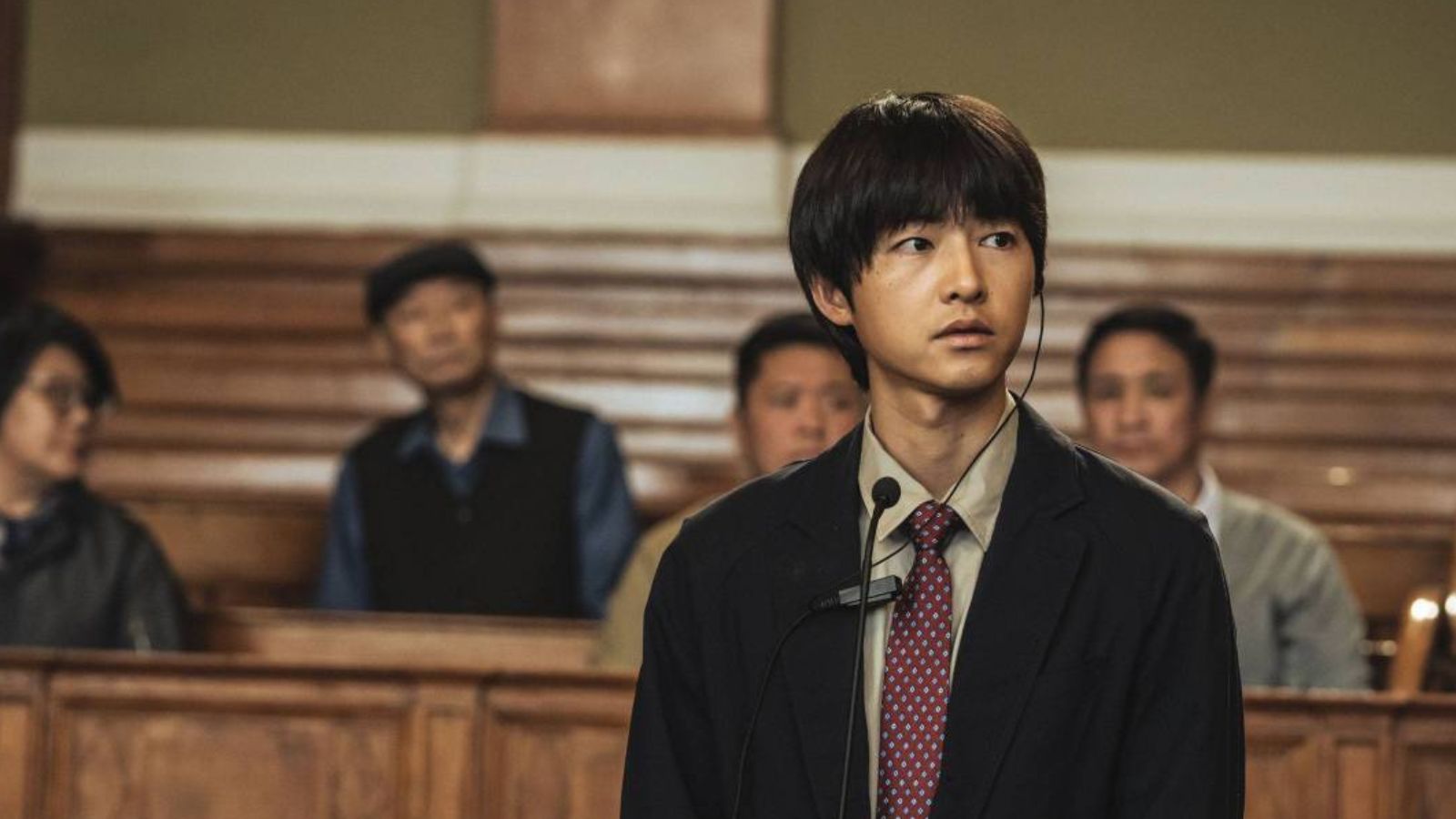
This is the life the North Korean people deserve, and every day, both within the country and without, they fight towards a better future. Their courage and indomitable spirit are not just figments of fiction. With your help, their freedom will become a reality.
Sign up below to learn how YOU can help support North Korean refugees today.




